Brake pads are toast, track day Saturday -- what to do?
#51
Well, yeah. Pads weren't really my fault. They had a lot of meat on them when i started the day. They would have passed any tech inspection. They're just utter crap under track conditions. As for rotors i haven't decided if they need replacing or not (regardless of the scoring). I just know they're getting kind of thin and they're now scored which makes me think it's almost time to change them.
#52
Use a micrometer and measure them...under minimum thickness...replace them 
If you are going to track..a big part of the budget is for brake stuff.....new fluid, pads, and rotors will be a common replacements.
Sometimes even motorsports pads only last a day or 2.....
And rotors...well that depends on which ones you have.....

If you are going to track..a big part of the budget is for brake stuff.....new fluid, pads, and rotors will be a common replacements.
Sometimes even motorsports pads only last a day or 2.....
And rotors...well that depends on which ones you have.....
#53
Use a micrometer and measure them...under minimum thickness...replace them 
If you are going to track..a big part of the budget is for brake stuff.....new fluid, pads, and rotors will be a common replacements.
Sometimes even motorsports pads only last a day or 2.....
And rotors...well that depends on which ones you have.....

If you are going to track..a big part of the budget is for brake stuff.....new fluid, pads, and rotors will be a common replacements.
Sometimes even motorsports pads only last a day or 2.....
And rotors...well that depends on which ones you have.....
One thing you can do (and I haven't read all this thread so I don't know if you've done it) is remove those stupid metal dust shield/rock guards on the back of the rotor. Dump them. Crap can them. Period. Don't even debate me on this please.
The next thing I'd do is to duct cool air to the fronts. This will greatly extend pad AND rotor life----regardless of what brake pad compound you use.
Lastly, it is quite possible you are exceeding the operating temp ceiling of your current brake pad(s). Here is a wonderful chart which WHY there are different compounds for different applications. For our race car running a 235 888 Toyo and a medium/stiff setup we have found the DTC 60/60 works best (for me). A 60F and 10R. A 70/60 is a bit grabby but stops on 9 cents coming off the high bank at Daytona at 140+.
Brake pads are a tuning tool and using what the "other guys" use may not work all the time. More demanding tracks, driving style (probably the biggest variable), available grip and pad thickness are all huge variables that you have to factor into the mix.
Word of advice for all of you. Just as Danno offers above, a brake pad is a consumable. Oil is a consumable. Gas is a consumable. Tires are a consumable. Stock up and bring consumables with you to the track. I have found after years and years of coaching new drivers that not having sufficient brake pad material is probably the first issue a new driver encounters. It can, and does ruin your weekend. The last 50% of pad wears much faster than the first 50%. The last 20-30% can wear lickity split----especially for a new driver who typically uses way too much brake everywhere. Driven correctly you don't need much brake use on these cars on the track. Pad wear is very good on these cars (as opposed to big V-8 Mustangs) because all 4 wheels are providing braking help due to the great balance of the RX-8's engine/chassis.
Hope that helps all of you.
Happy rotoring.
#54
One thing you can do (and I haven't read all this thread so I don't know if you've done it) is remove those stupid metal dust shield/rock guards on the back of the rotor. Dump them. Crap can them. Period. Don't even debate me on this please.
The next thing I'd do is to duct cool air to the fronts. This will greatly extend pad AND rotor life----regardless of what brake pad compound you use.
The next thing I'd do is to duct cool air to the fronts. This will greatly extend pad AND rotor life----regardless of what brake pad compound you use.
-especially for a new driver who typically uses way too much brake everywhere. Driven correctly you don't need much brake use on these cars on the track. Pad wear is very good on these cars (as opposed to big V-8 Mustangs) because all 4 wheels are providing braking help due to the great balance of the RX-8's engine/chassis.
https://www.rx8club.com/showthread.p...highlight=hawk
Brake late and brake hard. Which is it? Brake more or brake less? Maybe i'm misinterpreting what you're getting at.
Thanks!
#55
You have to take these things in stride... be upset at those who recommended these to you for track use. They didn't know of what they were speaking obviously. Life is full of "Ah ha!.. OMG..." and "ah ****!" moments. Most learning occurs at that exact moment...occassionally the hard way....but fortunately in this case you and your car went unscathed, instead, your fun that day and your checking account were damaged. The valueable lesson you'll not forget... for the best advice, listen or ask people who do, not to those who sell or have only heresay to back up their advice. Nuf said.
I have not done it. Great to know though. Next time i'm under my car those things are gone. I've been meaning to do the brake cooling ducts but i just haven't -- i have no excuses now, its a must.
I've been following the idea you laid out in this post:
https://www.rx8club.com/showthread.p...highlight=hawk
Brake late and brake hard. Which is it? Brake more or brake less? Maybe i'm misinterpreting what you're getting at.
Thanks!
I've been following the idea you laid out in this post:
https://www.rx8club.com/showthread.p...highlight=hawk
Brake late and brake hard. Which is it? Brake more or brake less? Maybe i'm misinterpreting what you're getting at.
Thanks!
He was also using Hp Plus pads as well which was surprising to me, but then again he was hardly on his brakes he used the flow of the car very well and was pushing it to its limit.
That 15 minute ride was the most enlightening ride I have taken to date.
#57
I've been following the idea you laid out in this post:
https://www.rx8club.com/showthread.p...highlight=hawk
Brake late and brake hard. Which is it? Brake more or brake less? Maybe i'm misinterpreting what you're getting at.
Thanks!
https://www.rx8club.com/showthread.p...highlight=hawk
Brake late and brake hard. Which is it? Brake more or brake less? Maybe i'm misinterpreting what you're getting at.
Thanks!
Braking is a self preservation instinct that isn't always necessary. Try this exercise at your next track day... start the session by driving the course without using brakes, do that by driving slowly enough that brakes aren't required, in your own best judgement. Then progressively and resolutely, throughout the rest of the session... increase overall AND cornering speeds without using brakes. You'll be totally amazed at what speed is possible cornering and how it makes the circuit flow better.
You'll find that your mad rush to "accelerate and brake, accelerate and brake" may simply NOT be the best (or fastest) way around a circuit. So after that no brakes lap or three.... attempt to combine the best of the *no braking* flow with MINIMAL use of brakes over the shortest distances (hard and fast braking), but only when ABSOLUTELY necessary, in your own judgement. The 'no brakes' lesson should have reduced your 'self preservation' instinct braking, and your lap time should steadily improve as a result of higher cornering speeds giving higher straightaway speeds and improved lap times.
One of the benefits of this attitude about braking is that your brakes WILL last much longer

Last edited by Spin9k; 06-11-2010 at 12:14 PM.
#58
I have 5 Braking zones on my home track. Two of them i have to brake hard for sure and one other hard braking zone i might be able to lighten up on but it's still a 180 degree turn. I'm not sure how to get more speed out of a 180 degree flat turn besides coming in at the perfect entry speed, perfect maintenance throttle and perfect line (combo of best line and best pavement).
One of the hard braking zones is from 95 down to 20 something so its hard to avoid braking hard for that one . The only way to screw it up is to over cook it, it's pretty much a throw away turn but going deep will slow you down. The second is a little trickier. I have to get on the brakes hard or my car will understeer which will throw me right off line. It's amazing how going deep and slightly missing the apex is SO much slower than taking the right line, cutting the curbing and being able to get on the gas full throttle WAY earlier. The car feels like a gutless tank if i do it wrong but feels like a little mosquito if i do it right.
. The only way to screw it up is to over cook it, it's pretty much a throw away turn but going deep will slow you down. The second is a little trickier. I have to get on the brakes hard or my car will understeer which will throw me right off line. It's amazing how going deep and slightly missing the apex is SO much slower than taking the right line, cutting the curbing and being able to get on the gas full throttle WAY earlier. The car feels like a gutless tank if i do it wrong but feels like a little mosquito if i do it right.
All the other turns are 60-75 mph turns that i could probably lighten up on and be a little more "flowing". I need more time and confidence though. This track is still pretty new to me. They run it clockwise and couter-clockwise so it's harder for me to learn it because they keep switching it up on me!!
One of the hard braking zones is from 95 down to 20 something so its hard to avoid braking hard for that one
 . The only way to screw it up is to over cook it, it's pretty much a throw away turn but going deep will slow you down. The second is a little trickier. I have to get on the brakes hard or my car will understeer which will throw me right off line. It's amazing how going deep and slightly missing the apex is SO much slower than taking the right line, cutting the curbing and being able to get on the gas full throttle WAY earlier. The car feels like a gutless tank if i do it wrong but feels like a little mosquito if i do it right.
. The only way to screw it up is to over cook it, it's pretty much a throw away turn but going deep will slow you down. The second is a little trickier. I have to get on the brakes hard or my car will understeer which will throw me right off line. It's amazing how going deep and slightly missing the apex is SO much slower than taking the right line, cutting the curbing and being able to get on the gas full throttle WAY earlier. The car feels like a gutless tank if i do it wrong but feels like a little mosquito if i do it right.All the other turns are 60-75 mph turns that i could probably lighten up on and be a little more "flowing". I need more time and confidence though. This track is still pretty new to me. They run it clockwise and couter-clockwise so it's harder for me to learn it because they keep switching it up on me!!

#61
They hold in heat....and dust
 Neither is good for anything but a street driven car
Neither is good for anything but a street driven car 
I have noticed without the shields you need clean the calipers a bit more, not sure why really....but routine cleaning and lubrication of floating calipers is a must if you expect them to preform to optimum
Brakes are something you need to get very comfortable with doing yourself unless you have deep pockets and can afford a mechanic at the track...or else you will end a lot of days early...or try and push the last bit out of the pads...that becomes a bit like Russian Roulette....
The club I drive with most often...and that I do Tech Inspections with....won't allow less than 50% pads at the start of the day for anything but the Novice group
#63
Excellent post.
My Zen master says, "Braking is only for when you MUST slow down, elsewize it's (literally) a waste of time". Having been required many yrs ago at a Watkins Glenn DE to drive an entire 25min session, along with everyone else, using NO BRAKES AT ALL on the entire course (emergencies excepted), appreciation of what CAN be done, when one MUST do it, is now instilled in me. An extremely valueable lesson in hindsight I might add! You MUST really look way up ahead and plan for corners way ahead under these circumstances!
Braking is a self preservation instinct that isn't always necessary. Try this exercise at your next track day... start the session by driving the course without using brakes, do that by driving slowly enough that brakes aren't required, in your own best judgement. Then progressively and resolutely, throughout the rest of the session... increase overall AND cornering speeds without using brakes. You'll be totally amazed at what speed is possible cornering and how it makes the circuit flow better.
You'll find that your mad rush to "accelerate and brake, accelerate and brake" may simply NOT be the best (or fastest) way around a circuit. So after that no brakes lap or three.... attempt to combine the best of the *no braking* flow with MINIMAL use of brakes over the shortest distances (hard and fast braking), but only when ABSOLUTELY necessary, in your own judgement. The 'no brakes' lesson should have reduced your 'self preservation' instinct braking, and your lap time should steadily improve as a result of higher cornering speeds giving higher straightaway speeds and improved lap times.
One of the benefits of this attitude about braking is that your brakes WILL last much longer
Braking is a self preservation instinct that isn't always necessary. Try this exercise at your next track day... start the session by driving the course without using brakes, do that by driving slowly enough that brakes aren't required, in your own best judgement. Then progressively and resolutely, throughout the rest of the session... increase overall AND cornering speeds without using brakes. You'll be totally amazed at what speed is possible cornering and how it makes the circuit flow better.
You'll find that your mad rush to "accelerate and brake, accelerate and brake" may simply NOT be the best (or fastest) way around a circuit. So after that no brakes lap or three.... attempt to combine the best of the *no braking* flow with MINIMAL use of brakes over the shortest distances (hard and fast braking), but only when ABSOLUTELY necessary, in your own judgement. The 'no brakes' lesson should have reduced your 'self preservation' instinct braking, and your lap time should steadily improve as a result of higher cornering speeds giving higher straightaway speeds and improved lap times.
One of the benefits of this attitude about braking is that your brakes WILL last much longer

#64
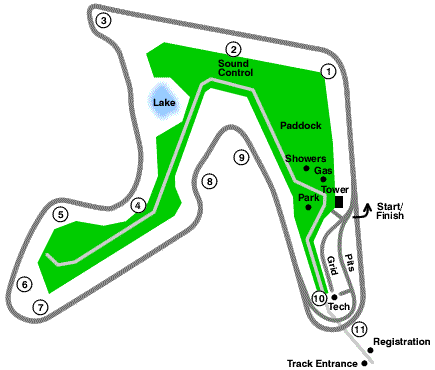
This looks like a track where, at least when running counter-clockwise, you should have only 2 hard braking zones while during the other turns you should be able to touch the brakes just to slow down\balance the car. It doesn't look very wide though from the pics on the net so maybe i'm wrong

#65
Yes, that's it. Unfortunately that map shows corner station numbers and not turn numbers.
I'm talking about turn 10 here (by corner station 10 and 11)
I;m referring to turn 2 here (corner station 3)
Turns 7,8,9 (also referred to as "The Bitch"). Or from the straight passed corner stations 8 and 9.
One other hard braking zone i might be able to lighten up on but it's still a 180 degree turn. I'm not sure how to get more speed out of a 180 degree flat turn besides coming in at the perfect entry speed, perfect maintenance throttle and perfect line (combo of best line and best pavement).
The second is a little trickier. I have to get on the brakes hard or my car will understeer which will throw me right off line. It's amazing how going deep and slightly missing the apex is SO much slower than taking the right line, cutting the curbing and being able to get on the gas full throttle WAY earlier. The car feels like a gutless tank if i do it wrong but feels like a little mosquito if i do it right.
#66
I see now 
Well, my car is set up as to oversteer so that instead of going wide I can try to keep the line by just letting the tires slide and correct the line with the steering wheel. This helped me reduce the use of the brakes and is the reason why I am generally against very wide tires (265 and up).

Well, my car is set up as to oversteer so that instead of going wide I can try to keep the line by just letting the tires slide and correct the line with the steering wheel. This helped me reduce the use of the brakes and is the reason why I am generally against very wide tires (265 and up).
#67
Here are some pics from my GoPro when i put it on picture mode on accident  You can get a better idea of the track layout and width. It's not a very wide track but it has it's moments.
You can get a better idea of the track layout and width. It's not a very wide track but it has it's moments.
Turn 1 -- ~105 braking to ~75 mph
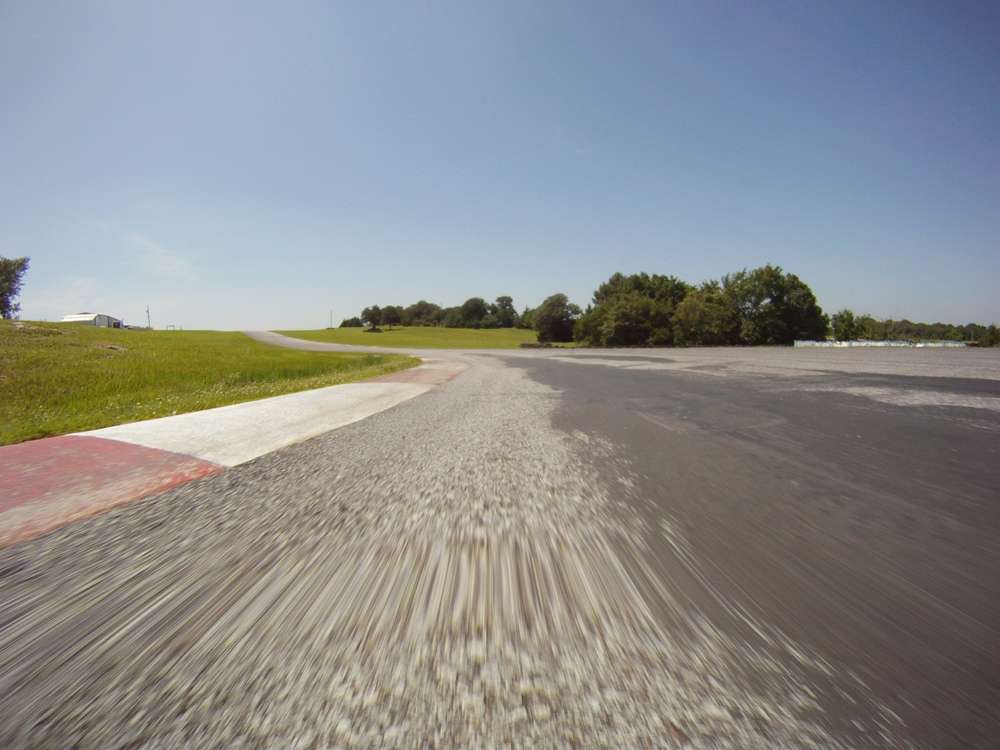
Coming out of turn 2 -- ~25-30 mph
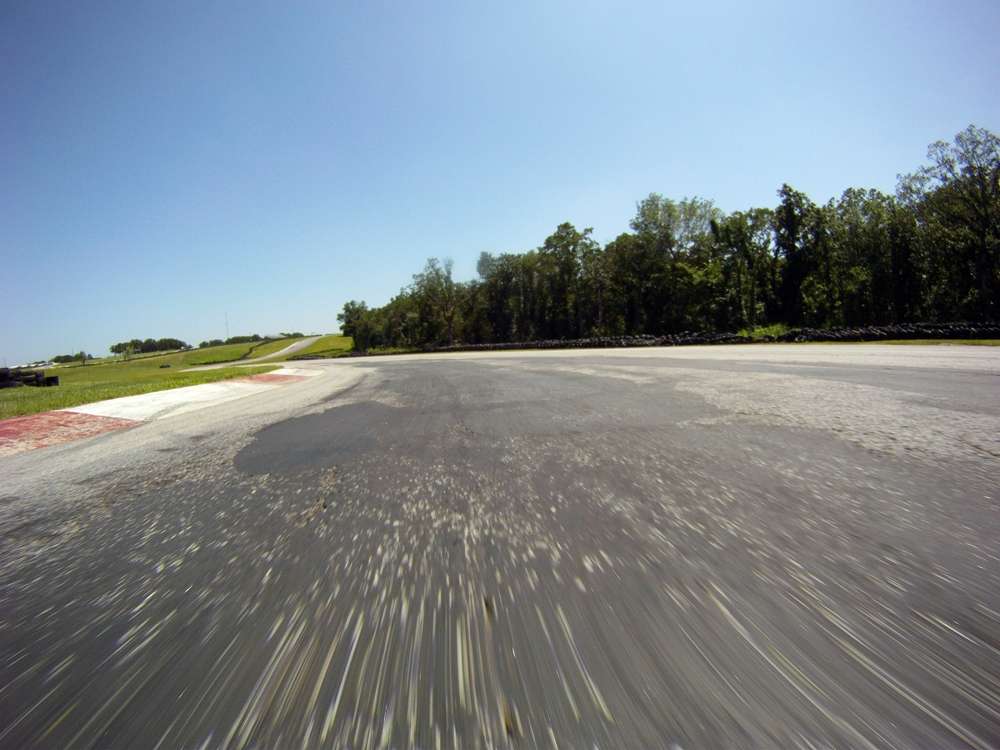
Turn 4 to turn 5 -- no idea of my speed here

Going through Turn 5
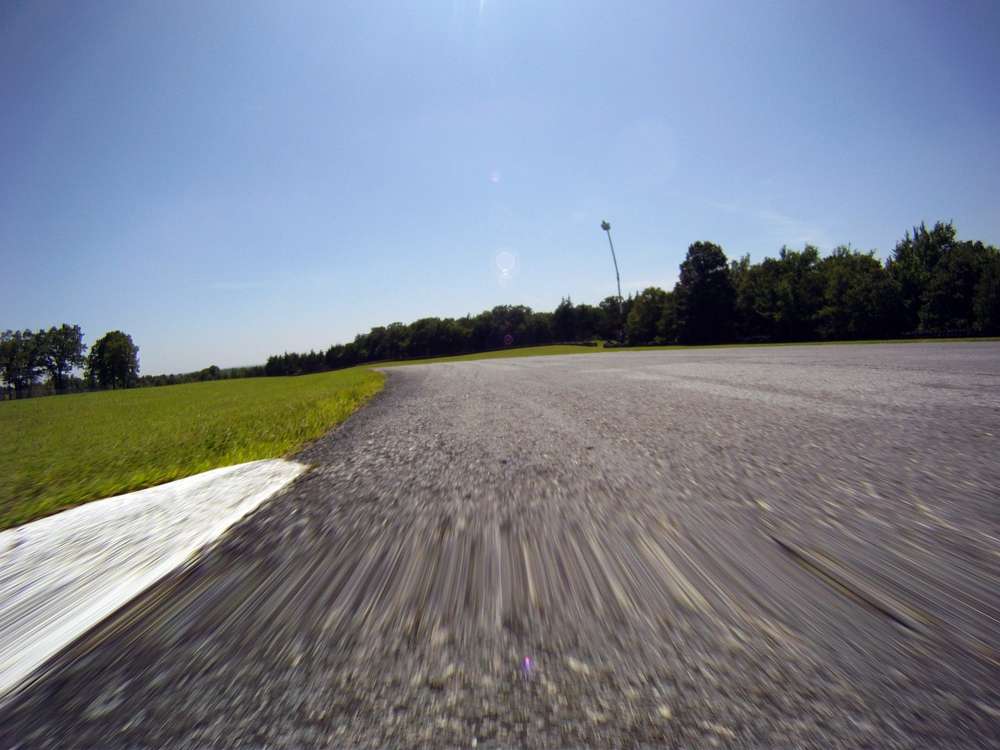
Turn 6

Approaching 'The Bitch'
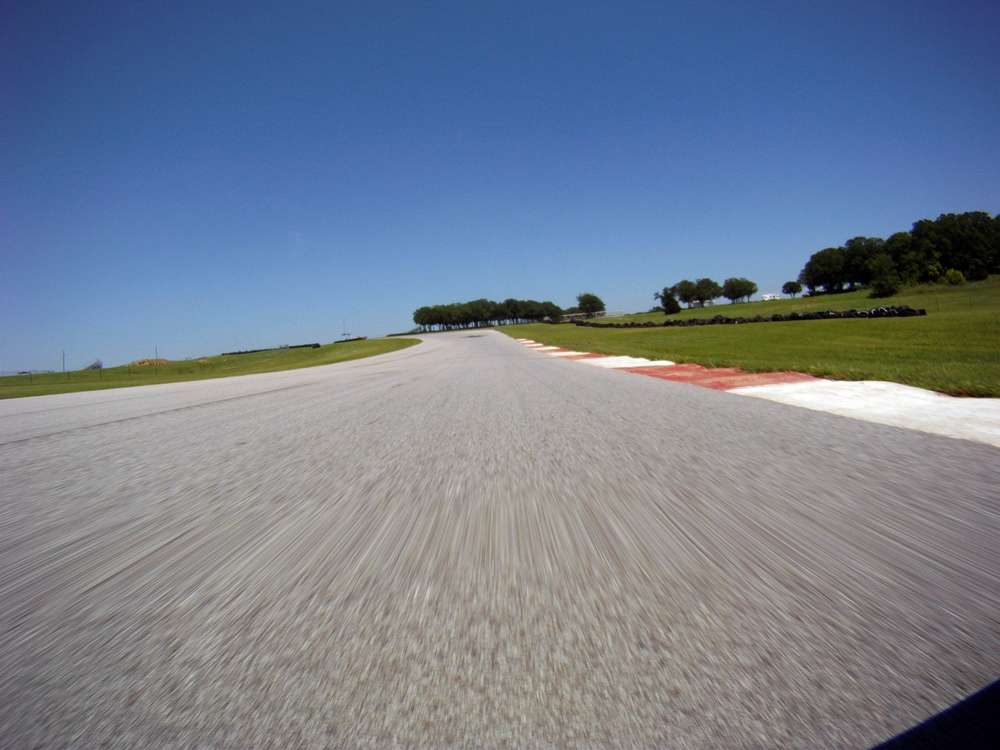
Braking zone for turn 9
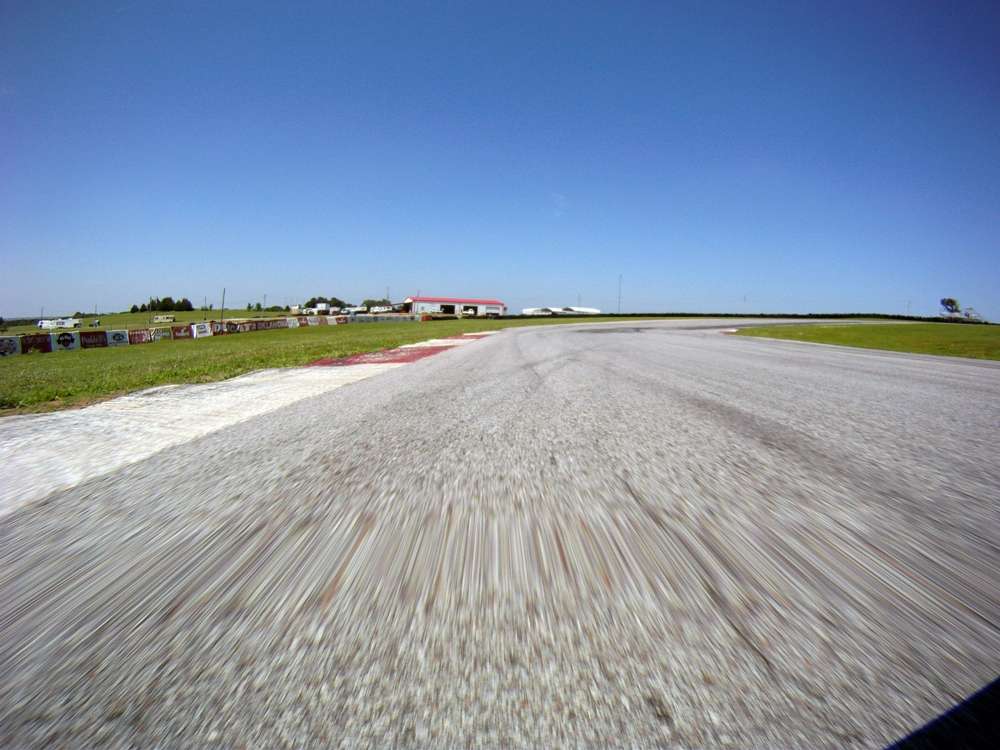
Coming out of turn 10
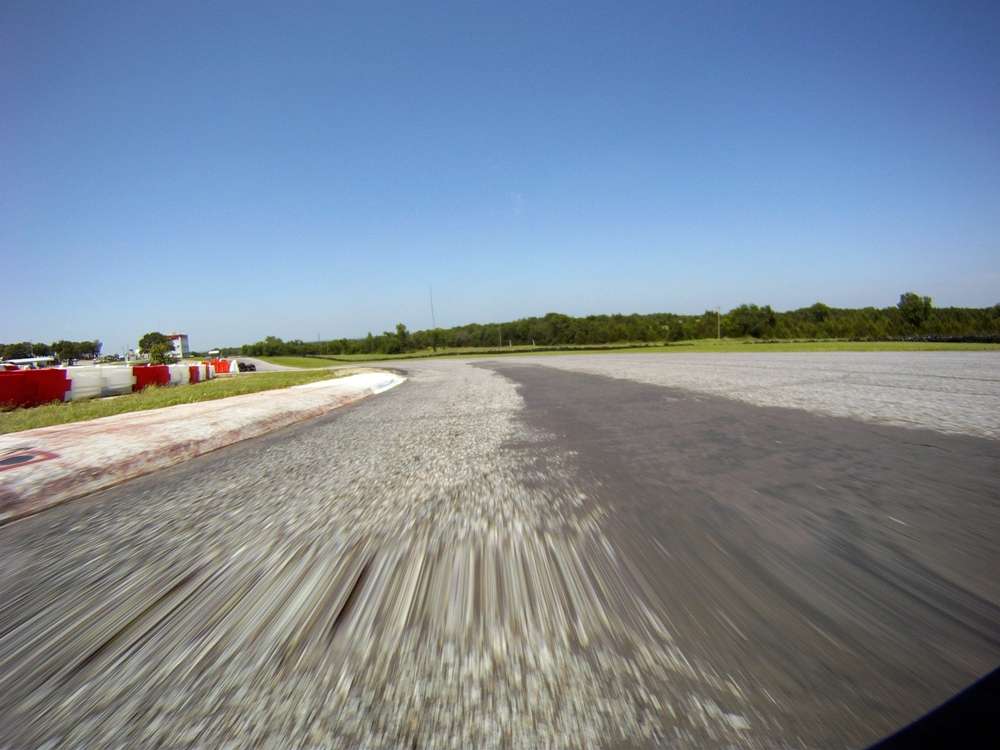
 You can get a better idea of the track layout and width. It's not a very wide track but it has it's moments.
You can get a better idea of the track layout and width. It's not a very wide track but it has it's moments.Turn 1 -- ~105 braking to ~75 mph

Coming out of turn 2 -- ~25-30 mph

Turn 4 to turn 5 -- no idea of my speed here

Going through Turn 5

Turn 6

Approaching 'The Bitch'

Braking zone for turn 9

Coming out of turn 10

#68
OK guys, heres the deal. Racing Brake offered to sell me a set of ET900's for $154 (50% off) since i had such poor luck with the ET800s. Do i risk the chance of blasting through these like i did with the ET800's or should i not waste my time and get Carbotechs for $276?
I'm torn. I'd like to think the ET900's would be a more appropriate pad than the ET800's but i just cant be sure until i try them. I'm thinking about skipping out on the deal and just going for the sure thing.
Thoughts?
I'm torn. I'd like to think the ET900's would be a more appropriate pad than the ET800's but i just cant be sure until i try them. I'm thinking about skipping out on the deal and just going for the sure thing.
Thoughts?
#70
 I'm confused. The ET900's are usually $308 and the Carbotechs are $276. So what are you sayin?
I'm confused. The ET900's are usually $308 and the Carbotechs are $276. So what are you sayin?Just trying to figure out if the ET900's will hold up long enough to be worth the discounted price of $154
#72
I'd say go for them ...then we'll all know. What have you got to loose anyway? I mean, $154 is half the cost of decent pads...who knows...you might catch a break 
ps.. also cudos to RB for offering

ps.. also cudos to RB for offering
#73
I think i'll give them a shot. Better compound, some brake cooling ducts, no dust shields... should work out better than last time around. I can't promise i'll brake less but i'll try 
Most likely hitting the track at the end of the month so i'll let you know how they work out.

Most likely hitting the track at the end of the month so i'll let you know how they work out.
#74
OK guys, heres the deal. Racing Brake offered to sell me a set of ET900's for $154 (50% off) since i had such poor luck with the ET800s. Do i risk the chance of blasting through these like i did with the ET800's or should i not waste my time and get Carbotechs for $276?
I'm torn. I'd like to think the ET900's would be a more appropriate pad than the ET800's but i just cant be sure until i try them. I'm thinking about skipping out on the deal and just going for the sure thing.
Thoughts?
I'm torn. I'd like to think the ET900's would be a more appropriate pad than the ET800's but i just cant be sure until i try them. I'm thinking about skipping out on the deal and just going for the sure thing.
Thoughts?
Let me know how you like them.
#75
Rotary Runner Redux
iTrader: (3)
Joined: Aug 2008
Posts: 307
Likes: 1
From: DelMarVa by the "Bridge"
Having finished the second (and last ) weekend for a set of ET800s, I can attest that Jantzen's experience was dead on. The pads have great bite, but they literally evaporate on track. One exuberant weekend on Shenandoah, one-and-a-half days on Thunderbolt, the front pads were down almost to the rivets, back pads at 1/3rd original. The "Get 'er home!" 1/2 worn HP Ceramics I'd taken off and racked in the track kit saved the day. 
Folks, there is no excuse for wrecking rotors on a track day. A simple "no-go" gauge and looking at the brakes EVERY TIME you come off-track will tell you what's happening with the pads before you start gouging up a $500 super-slotted cross-drilled.

Yep. That's all it is. A cheapie Lowes flat-tip screwdriver and a piece of painter's tape.

Using the "squealer" on the back brake pad, eyeball the backer plate and depth of the squealer, then just place a wrap of painter's tape around the blade to mark it.

I don't have a good shot of this from the car, so bear with me. After a run, just take the taped 'driver and stick it in a gap around the brake pad in the caliper, hold the tip against the rotor, and then lean the blade against the edge of the backer plate.

The area of tape between the line and the bare tip, shows you the depth of the remaining pad material over the rivets.
One other thing you can see before things go bad with the pads. When the material is getting thin over the rivets, there is a lot of heat buildup in that area. A normal rotor has a uniform color from edge to hub. When the pad is worn almost to the rivets, you can see a stripe or different colored haze on the rotor from the hotter material over the rivets.
My $.02 on the subject.

Folks, there is no excuse for wrecking rotors on a track day. A simple "no-go" gauge and looking at the brakes EVERY TIME you come off-track will tell you what's happening with the pads before you start gouging up a $500 super-slotted cross-drilled.

Yep. That's all it is. A cheapie Lowes flat-tip screwdriver and a piece of painter's tape.

Using the "squealer" on the back brake pad, eyeball the backer plate and depth of the squealer, then just place a wrap of painter's tape around the blade to mark it.

I don't have a good shot of this from the car, so bear with me. After a run, just take the taped 'driver and stick it in a gap around the brake pad in the caliper, hold the tip against the rotor, and then lean the blade against the edge of the backer plate.

The area of tape between the line and the bare tip, shows you the depth of the remaining pad material over the rivets.
One other thing you can see before things go bad with the pads. When the material is getting thin over the rivets, there is a lot of heat buildup in that area. A normal rotor has a uniform color from edge to hub. When the pad is worn almost to the rivets, you can see a stripe or different colored haze on the rotor from the hotter material over the rivets.
My $.02 on the subject.




